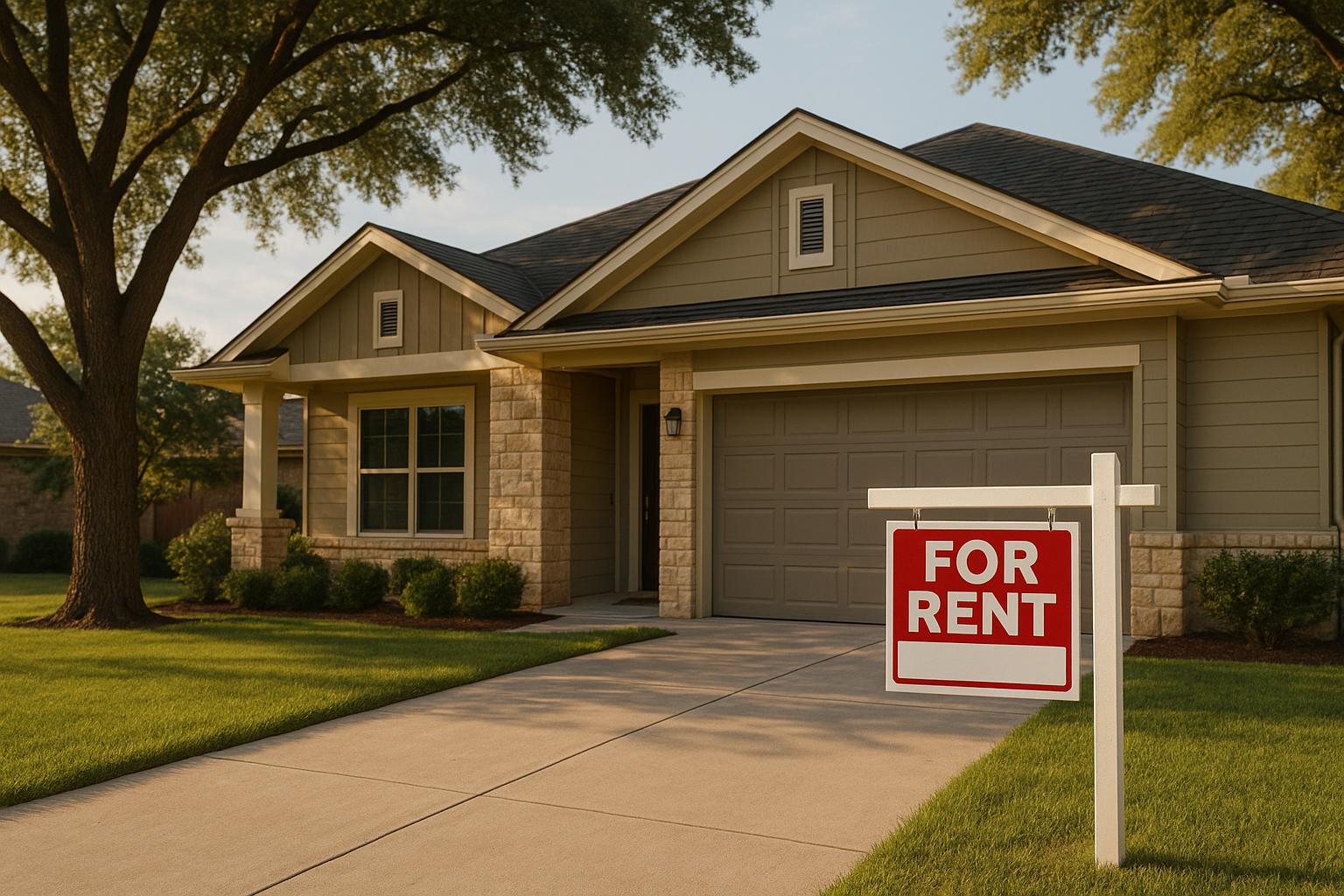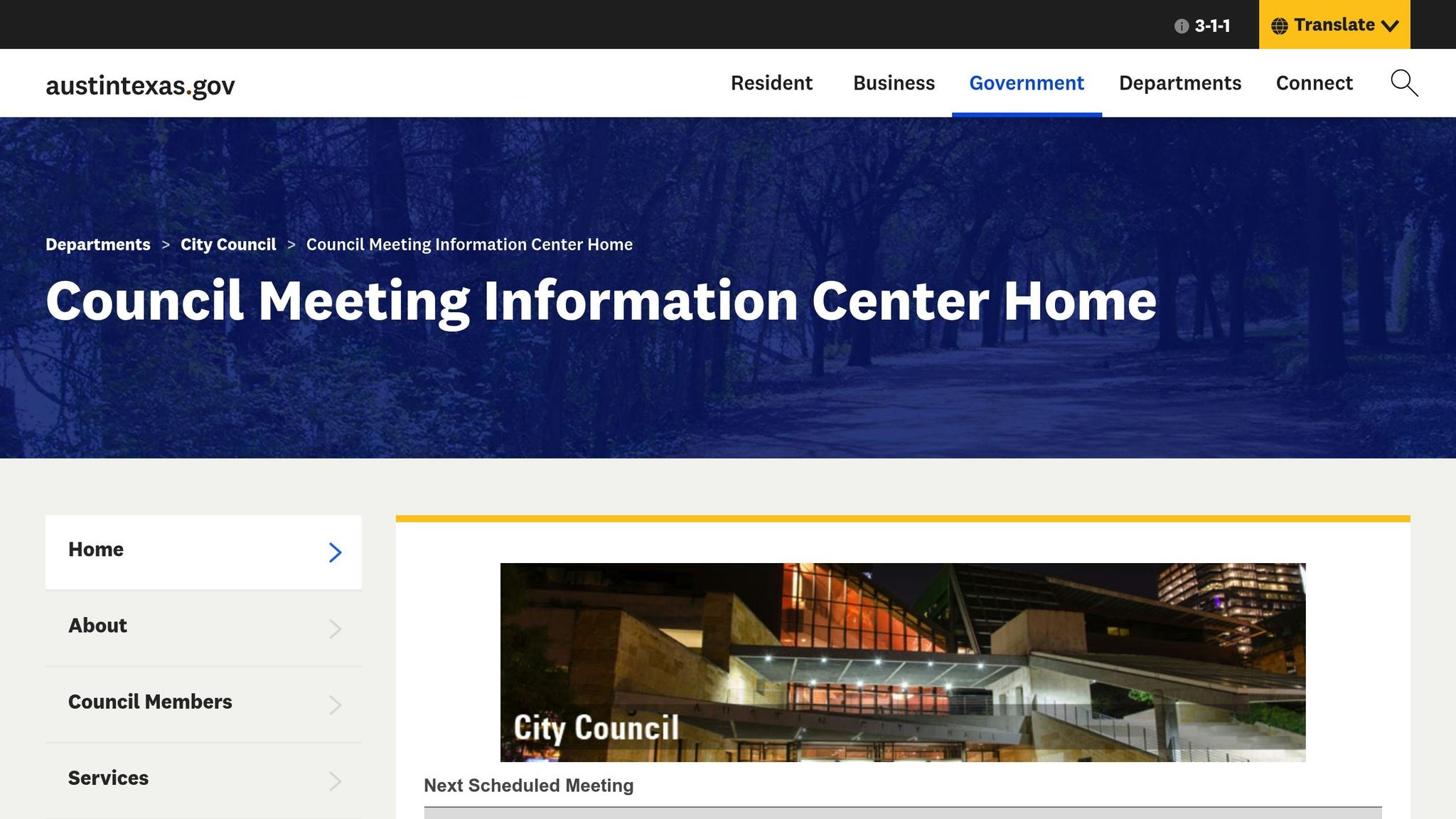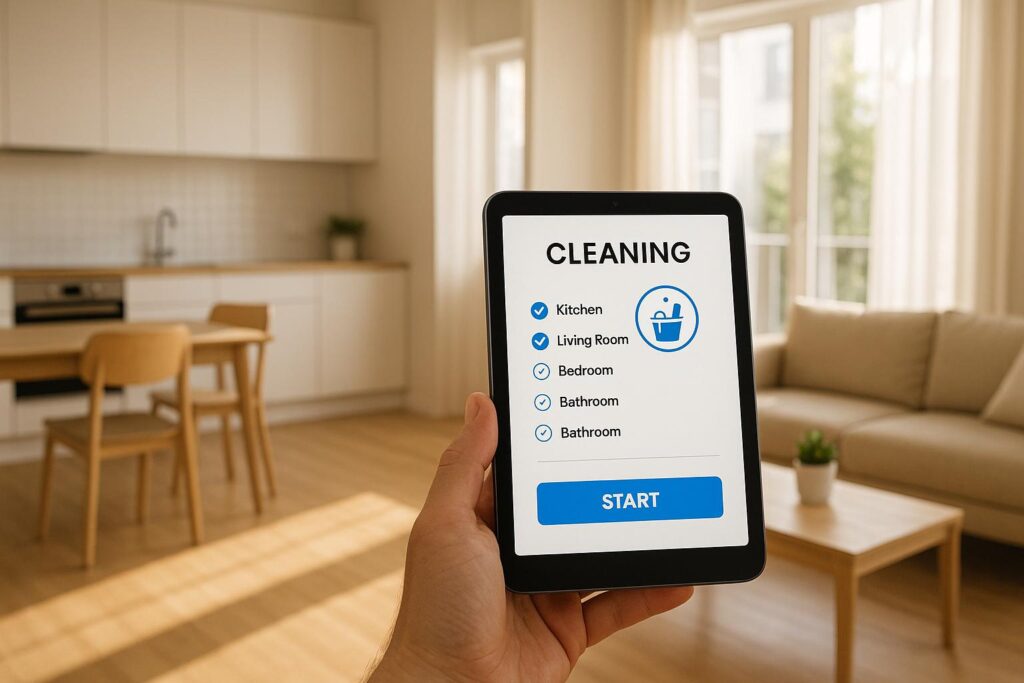If you own a short-term rental (STR) property in Austin, staying compliant with the city’s rules is non-negotiable. Violating these regulations can lead to fines, license revocation, or even legal trouble. Here’s what you need to know:
- Licensing is mandatory: All STRs must have an active license, and starting October 1, 2025, stricter rules apply.
- Display your license number: Since September 11, 2025, listings must include license numbers. Platforms will enforce this starting July 1, 2026, with fines up to $500/day.
- Pay hotel taxes: You’re responsible for collecting and paying hotel occupancy tax, even if platforms assist with it.
- Follow safety and occupancy rules: Overcrowding or neglecting safety standards like smoke detectors and fire extinguishers can lead to penalties.
- Address complaints: Ignoring issues reported via the city’s system can escalate problems and risk your license.
To avoid penalties, keep your property up to code, renew licenses on time, and respond to complaints promptly. Use trusted platforms and consider consulting local experts to navigate Austin’s evolving STR landscape.
Austin City Council agrees to short-term rental code amendments
Common Mistakes That Lead to Fines
Austin doesn’t mess around when it comes to enforcing short-term rental (STR) rules. The penalties for breaking these regulations can hit hard, even though the city’s STR code enforcement team is working with just six staff members. Let’s break down some common mistakes that could cost you big time and how to avoid them.
Operating Without a Valid STR License
Running a short-term rental without a proper license is one of the priciest errors you can make. Austin requires all STR properties to have an active license before hosting guests. While there are 2,413 licensed rentals in the city, many properties still operate illegally. Residents have even described enforcement as "practically non-existent". However, having a valid license not only keeps you compliant but also ensures your property meets safety standards.
Missing License Numbers on Listings
If you’re licensed but forget to include your license number in your rental ads, you’re still at risk. Since September 11, 2025, Austin has required hosts to display their license numbers on all advertisements. Starting July 1, 2026, platforms will enforce this rule with fines of up to $500 per day. To avoid this, double-check that your license number is clearly visible on every platform where your property is listed.
Failing to Pay Hotel Occupancy Tax
Collecting and paying hotel occupancy taxes is non-negotiable. Mistakes in calculating or remitting these taxes can lead to hefty penalties, back taxes, and interest.
"This has been a thorny and difficult issue. It has been through many lawsuits and permutations, and I feel like we’re finally getting to a point where we have a workable, enforceable ordinance that can withstand legal challenge and also generate the hotel occupancy tax that that that we’ve been trying to get into the the city coffers." – Council Member José Vela
Staying on top of your tax obligations is a must to keep your business running smoothly.
Breaking Occupancy Limits or Safety Rules
Overcrowding your rental or neglecting safety features like smoke detectors, fire extinguishers, and emergency exits can lead to complaints, fines, or even losing your license. With updated safety standards in place, it’s wise to regularly inspect your property to ensure everything is up to code.
Ignoring Complaints or Violations
Ignoring complaints filed through the city’s online system can backfire quickly. Addressing neighbor concerns promptly helps protect your license and keeps your property’s reputation intact. Taking a proactive approach to resolving issues can save you from bigger headaches down the road.
Austin’s Enforcement and Penalty Structure
Austin takes a tiered approach to enforcing short-term rental (STR) regulations, with penalties escalating based on the severity and frequency of violations. To avoid penalties, it’s crucial for rental owners to understand the potential consequences of noncompliance.
Administrative and Criminal Penalties
Violations in Austin fall into two categories: administrative and criminal. Administrative violations – like minor listing errors or small safety oversights – result in fines that don’t involve court proceedings. On the other hand, serious offenses, such as operating without a valid license or consistently exceeding occupancy limits, can lead to criminal charges and court action. Repeat offenses typically result in higher fines and stricter penalties.
License Revocation and Property Delisting
For major or repeated violations, Austin has the authority to revoke an STR license. Properties with multiple infractions, unresolved safety issues, or ongoing neighbor complaints may face license suspension and removal from rental platforms. To regain a license, owners must undergo a review process to prove that all violations have been addressed.
Complaint Handling and Neighbor Notifications
Austin provides an online system for neighbors to report STR violations. Property owners are required to respond to these complaints promptly, or they risk escalating penalties. Keeping contact information up-to-date is essential, as some reports may also notify neighboring properties. For noise-related issues, the city starts with a warning for the first complaint. However, repeated disturbances can lead to fines, mediation requirements, or even temporary suspension of the property’s rental license.
sbb-itb-4c99469
How to Avoid Penalties and Stay Compliant
Sticking to Austin’s short-term rental (STR) rules is essential to avoid fines and protect your property investment.
Getting and Renewing STR Licenses
To legally operate, you’ll need a valid STR license, which can be obtained online through Austin’s Development Services Department. New licenses are issued for two years.
Plan ahead for renewals – submit your application at least 30 days before your license expires. A clean compliance record can help speed up the process. If any details about your property change, notify the city immediately. Keep in mind, late renewals come with extra fees and can disrupt your ability to operate legally.
Once you’ve secured your license, focus on meeting safety requirements to keep it active.
Meeting Safety and Occupancy Standards
Safety should be a top priority. Install smoke detectors (and carbon monoxide detectors if required) and test them monthly. Replace their batteries twice a year to ensure they’re always functioning properly.
Austin enforces strict occupancy limits: two guests per bedroom, plus two additional people. Exceeding these limits can result in fines, so make sure your listings clearly state these rules.
Fire safety is another critical area. Your property must have accessible fire extinguishers and clearly marked emergency exits. If your property has a pool, take extra precautions. Pools must have secure fencing, gates that self-close and latch, and visible safety rules. Additionally, keep records of regular maintenance for pools and hot tubs.
Using reliable platforms and seeking local expertise can make compliance easier.
Using Trusted Platforms and Local Experts
Choosing the right booking platform can simplify tax compliance. Platforms like Airbnb and VRBO automatically handle Austin’s hotel occupancy tax, reducing your workload. However, you’re still responsible for ensuring your license number is displayed correctly on all listings.
Teaming up with local real estate professionals who understand Austin’s STR regulations can be a game-changer. For instance, Austin Local Team connects property owners with experienced agents who stay informed about regulatory updates. These experts can help you navigate zoning laws, permits, and audits, ensuring you stay compliant.
Having local guidance not only keeps you informed but also helps streamline your operations.
Managing Complaints Quickly
Addressing complaints promptly – within 10-15 business days – is crucial to avoid penalties or even license suspension. Set up clear communication channels with your guests before their stay. Provide your contact information (or your property manager’s) and share detailed house rules, including noise restrictions, parking guidelines, and occupancy limits.
When complaints arise, document everything. Take photos of any damage, save records of guest communication, and keep logs of any corrective actions. This documentation can be vital if disputes escalate or if the city requests proof of your compliance efforts.
Maintaining good relationships with neighbors is equally important in Austin, where enforcement often relies on complaints. Introduce yourself to your neighbors when you start operating, share your contact information for any concerns, and address issues quickly. Building strong neighbor relations can often prevent formal complaints from being filed in the first place.
Effective communication with both guests and neighbors is key to running a successful STR in Austin.
Annual Compliance Review and Staying Updated
Keeping up with short-term rental (STR) regulations is essential to protect your investment. Here’s a breakdown of how to conduct your annual compliance review and stay informed about changes.
Doing Annual Compliance Checks
Start by creating an annual checklist that covers all aspects of compliance. Begin with your license status. Recent updates now extend licenses from one to two years, and renewals can be submitted up to 60 days before expiration.
Your review should also include verifying your Hotel Occupancy Tax (HOT) compliance. While platforms will begin collecting HOT starting April 1, 2025, you’re still required to submit quarterly reports detailing the collected amounts. For context, Austin currently collects around $7 million annually in HOT from licensed STRs, with projections exceeding $11 million for fiscal year 2024–25.
Next, check your insurance documentation. You’ll need to provide proof of property insurance – such as the declaration or summary pages – when renewing your license. If your license is set to expire within 30 days, you can request an extension by emailing STRlicensing@austintexas.gov and attaching proof of insurance.
Additionally, update your local contact details and guest information packets. With new regulations requiring neighbor notifications at every license renewal (not just during the initial application), maintaining strong relationships with neighbors has become even more important.
Don’t overlook safety measures. Conduct a safety audit to ensure smoke detectors, fire extinguishers, and emergency exits meet current standards. If your property includes amenities like a pool, confirm that it complies with local pool safety regulations.
Once you’ve reviewed your internal documents, consider tapping into local expertise to stay ahead of compliance updates.
Using Local Resources for Updates
Beyond self-audits, relying on local knowledge can be a game-changer. Austin’s STR landscape is constantly evolving, and keeping up can be challenging. Currently, the city has about 2,400 registered STRs, yet third-party data suggests there are nearly 15,000 active listings in the area. This gap highlights how many operators may be unaware of critical compliance updates.
Local experts, such as the Austin Local Team, can provide insights into regulatory changes and compliance requirements. Their connections with real estate professionals and familiarity with Austin’s STR policies can alert you to upcoming changes that could impact your business.
Consider this: 94% of 311 complaints about STRs in Austin involve unlicensed properties. Staying informed and compliant not only helps you avoid fines but also supports the integrity of the STR market in Austin.
Using local resources can also help you identify enforcement trends, allowing you to focus your compliance efforts where they matter most.
Staying Ahead of Rule Changes
On September 11, 2025, the Austin City Council adopted updated STR regulations, with new responsibilities for licensees and operators taking effect on October 1, 2025, and platform-specific regulations starting on July 1, 2026. These shifts highlight how quickly the regulatory environment can evolve.
Stay updated by subscribing to notifications from Austin’s Development Services and engaging with local STR groups. Public forums often discuss major regulatory changes well before they are implemented, giving you time to prepare.
Keep thorough records of compliance updates and communications. This documentation can be invaluable during inspections or if you face complaints.
Finally, weigh the costs of proactive compliance against the potential financial hit of falling behind. Investing in updated safety equipment, revising guest materials, or consulting with local experts is far less expensive than dealing with penalties, legal issues, or lost revenue from violations.
Building relationships with other compliant STR operators can also provide useful insights into enforcement trends and practical solutions for navigating new challenges. Collaboration can be a powerful tool in staying ahead of the curve.
Conclusion
Managing short-term rental (STR) properties in Austin means staying on top of the city’s detailed regulations. With so many STRs in operation, failing to comply with local rules can lead to significant risks for property owners.
To protect your investment, make sure you’ve got the right STR license, clearly display it on all your listings, meet your tax responsibilities, and follow safety standards. These steps are essential to keeping your business running smoothly. If the process feels overwhelming, seeking expert advice can make it much more manageable.
Local expertise plays a big role in navigating Austin’s complex STR landscape. Professionals who specialize in STR compliance can help with everything from securing permits to understanding zoning rules and handling taxes.
The Austin Local Team is a valuable resource for STR owners, offering guidance to tackle compliance challenges and stay updated on regulatory changes. Regularly reviewing your compliance, keeping your records current, and consulting local experts are smart moves to ensure your property stays on the right side of the law. Protect your investment by staying informed and prepared.
FAQs
How can I make sure my short-term rental in Austin meets the new regulations starting October 1, 2025?
To comply with Austin’s updated short-term rental regulations, effective October 1, 2025, you’ll need to take a few key steps. First, secure a valid rental license, which will now have a two-year validity period. It’s also crucial to ensure your property is properly registered – platforms like Airbnb and Vrbo will be required to remove any unlicensed listings. These platforms will also handle the collection of the 11% lodging tax for stays of 30 days or less.
The new rules place additional limits on short-term rentals, capping them at 10% of units in multifamily buildings unless the property includes commercial space. Remember to display your permit in a visible location on the property and stay up to date with any changes to local requirements. By regularly reviewing city guidelines and adhering to licensing, tax, and operational standards, you can avoid potential fines or penalties.
How can I address complaints and maintain good relationships with neighbors to avoid fines for my Austin short-term rental?
To keep your Austin short-term rental running smoothly and avoid fines while maintaining good neighborly relations, focus on open communication and responsible management. Start by introducing yourself to nearby residents and providing your contact details. This way, if any issues come up, they can reach out to you directly. A friendly and approachable attitude goes a long way toward building trust.
Establish clear house rules for your guests, covering things like quiet hours, parking, and proper trash disposal. Make it a habit to check on your property regularly to ensure these rules are being followed, and address any concerns quickly. By being a thoughtful host and neighbor, you can minimize complaints and steer clear of potential penalties.
What happens if I don’t include my short-term rental license number in my Austin listing, and how can I stay compliant?
If you’re listing a short-term rental (STR) in Austin, displaying your STR license number isn’t optional – it’s required. Failing to include this information in your listing could result in fines, penalties, or even the suspension of your rental license. The city enforces this rule to ensure all rental properties comply with local regulations.
To steer clear of these penalties, make sure your STR license number is clearly visible in every advertisement. It’s also a good idea to keep an eye on updates to Austin’s short-term rental regulations by checking official city announcements. Staying informed and compliant helps protect your business and ensures your rental operates without interruptions.






